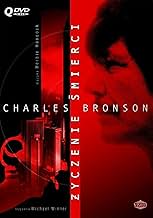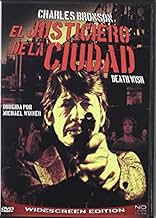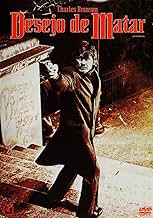A New York City architect becomes a one-man vigilante squad after his wife is murdered by street punks. In self-defense, the vengeful man kills muggers on the mean streets after dark.A New York City architect becomes a one-man vigilante squad after his wife is murdered by street punks. In self-defense, the vengeful man kills muggers on the mean streets after dark.A New York City architect becomes a one-man vigilante squad after his wife is murdered by street punks. In self-defense, the vengeful man kills muggers on the mean streets after dark.
- Director
- Writers
- Stars
- Awards
- 1 win & 2 nominations total
- District Attorney
- (as Fred Scollay)
- Lt. Briggs
- (as Ed Grover)
- Director
- Writers
- All cast & crew
- Production, box office & more at IMDbPro
Featured reviews
New York businessman Paul Kersey (Charles Bronson) is devastated when his wife (Hope Lange) and daughter (Kathleen Tolan) are sexually assaulted in their own home. His wife dies from her injuries and his daughter is so deeply traumatized that she is left in a permanent vegetative state. Kersey tries to get some normality back into his life through work, but deep down inside he's burning for revenge. He knows he will never get the actual gang who harmed his family, but he also realises that crime in general is spreading through the city like a plague. So, armed with a gun and a sense of vigilante justice, he starts patrolling the streets by night, killing muggers, hoodlums and rapists. But for how long can he hand out his own brand of justice without being caught? And at what point does his course of action stop being justifiable? When does he become just as bad as the crooks he is trying to rub out?
The film is based on a Brian Garfield novel, but in the book vigilantism was illustrated as an extension of crime - just another problem as opposed to a solution. Here Michael Winner, a director always happy to create a few ripples, presents the vigilante as an out-and-out hero. The film basically gives a great big nod of approval to Kersey's actions. The sense of humour really helps the film (I still laugh at the scene where some construction-workers kick the hell out of a crook, and one workman nonchalantly states to the TV reporters: "Erm, we roughed him up a bit before the cops arrived!") Death Wish was a pretty influential film for its era, and in spite of its dated air and its morally dubious stance, it is still a great flick. Just make sure you steer clear of its four utterly terrible sequels.
Charles Bronson is Paul Kersey, a New York architect whose wife is killed by a group of muggers ransacking their apartment, an attack that also leaves his daughter catatonic. The killers are never caught, and Kersey is left shattered.
He takes a job working for a land developer in New Mexico to get his mind off his troubles, and while there his long dormant fascination with guns is renewed when his client Ames Jainchill (Stuart Margolin) shows off his personal collection and lets him crack some shots off. He also witnesses a live reenactment of an Old West shootout, where frontier justice was administered at the end of the gun.
Kersey soon arrives back in New York, livened up a bit from his visit and ready to resume his life. But the streets are still filled with thugs, and Kersey knows that Manhattan is not the best place to be at night. He discovers that Jainchill has given him a .32 revolver as a present, and subsequently uses it to kill a man trying to mug him. Kersey soon realizes the cathartic release of enacting vigilante revenge as the media reports his killings and other private citizens take action, all while police officer Frank Ochoa (Vincent Gardenia) leads a task force to capture the vigilante and stop future violence.
"Death Wish" was a product of its day -- a Nixon-era knee jerk reaction to rampant crime that turned out to be quite a hit. But to dismiss it simply as that would be to deny the film its true power. It asks the question of whether or not vigilantism can be used as a social good, and just how can a citizen properly defend himself from criminal attacks. More importantly, to the movie's credit it does introduce the downside of vigilantism, with Ochoa worrying that people will be whipped into such a frenzy that they'll start attacking anyone who looks suspicious.
The movie does play it safe when it comes to Kersey's "victims" however. Every one of them is clearly a mugger, threatening his life or just wanting his money. But the movie does enter into ambiguous territory by looking at the actual actions Kersey takes. At first he just stumbles into traps set up by muggers or happens on a crime taking place; later on the other hand it's clear that he's actually inviting attacks by making himself a target. And the self-defense aspect of his actions becomes equally cloudy when he kills muggers that are already fleeing. He wants to punish them for their crimes, which itself can be morally troubling.
But to understand "Death Wish" you had to understand the times. Murder rates were very high in New York City, and many muggers had little problem killing their victims. The criminals in the film are not overly sympathetic either, most of them clearly hippies or other social undesirables, probably hooked on drugs from their "free love" days and now stuck in the bitter reality of narcotic dependency now that the good times are over. It's hard to feel sorry for someone willing to kill you just for a couple hours worth of pleasure. I'm sure the movie's audiences in New York, and probably across the country, enjoyed living out their revenge fantasies vicariously through Kersey.
It should be said that Bronson, normally criticized as a wooden actor, gives a remarkably strong performance. This may be due to his friendship with director Michael Winner, who also helmed several of his other films. But it's probably due to the fact that the movie was not written as an action hero vehicle, and because of this the story demanded a character more grounded in reality. Kersey is not a superhero -- he's just one man trying to make a difference in the world.
Also, he's not all there, either. The movie makes it clear that Kersey is a little deranged as well, and one wonders just how far he might go to do what he thinks is right. The sequels were more interested in making him out to be an infallible crusader against evil, abandoning any pretext of social commentary and just offering body counts, but here at least the movie shows that someone willing to go on a shooting spree isn't quite right in the head, regardless of the guilt of his victims.
Supporting roles are excellent as well. A very young Jeff Goldblum nails his performance as one of the muggers who invades Kersey's apartment, immediately scary and repellent. Gardenia is a nice foil for Bronson, making Ochoa an intelligent officer not unsympathetic to Kersey's crusade, especially when he sees how the crime rate plummets following the killings. Christopher Guest, who would go on to star in hit mockumentaries like "This is Spinal Tap," "Best in Show" and "A Mighty Wind" has a small but memorable role as a police officer towards the end of the movie. In fact, everyone does a good job.
Ultimately, your enjoyment of "Death Wish" will probably rely both on your politics and views toward crime. It's a movie where the critic is judged based on his review, which is just as well I suppose. It's at once fascinating, and still very timely.
Nine out of ten stars. Bronson's best solo movie and certainly a very thought-provoking piece, which is lost on both people who only want to watch it for the mugger killings and those who just dismiss it a fascist trash.
Rather than Bronson's performance Death Wish has its significant themes and screenplay components which were used at almost every action/crime movie later on, thus became clichés of their genre. Spending a lot of the running time through the bad guys' side is the most fundamental component. This development was so modern and original, after a while it changed the outlook of the Crime genre.
Death Wish is nearly as good as Eastwood's Dirty Harry, with just a different taste. Obviously, this should have been produced only once; since the sequels misrepresented its purpose.
Bronson as well as director Michael Winner and writer Brian Garfield touched a raw nerve in "Death Wish" with the American people in big cities under siege like no other movie ever did before and, now some 30 years later, after. Since "Death Wish" there must have been made over a hundred films with it's theme but none had the impact that "Death Wish" with Charles Bronson had.
A group of tugs get Joanna Kersey's, Hope Lange, address from a delivery slip of a local grocery store and acting as if their delivering her groceries break into Joanna's apartment and savagely attack her and beat and rape her daughter Carol, Kathleen Tolan. Paul Kersey, Charles Bronson, comes home to learn that his wife and daughter are in the hospital rushes over to see how they are. Kersey finds out that his wife is dead and his daughter is mentally destroyed and needs to be institutionalized for life.
The whole world around Paul Kersey falls apart like a house of cards and he's left alone with everything that he loved dead or as good as dead. Some time later going to Arizona to do his job as a land developer for his firm in NYC he's given a .32 handgun as a gift by the person that he worked for Ames Janichill, Stuart Margolis, for the great job that he did for him.
One night back home in New York City taking a stroll in the park with the gun on him Kersey is accosted by a local junkie who pulls a handgun on him but Kersey draws first and shoots and kills him. Sick at first over what he did, killed a human being, Kersey like a wild beast from the jungle tasting blood for the fist time begins to roam the streets of New York at night for prey. A vengeful Kersey goes out looking for criminals to put out of commission, like those who killed and raped his wife and daughter, as some kind of revenge and retribution against them. In the process Kersey puts the criminals of the city of New York into a state of absolute terror and panic. In his guerrilla-like actions Kersey knocks off some dozen of them sending the the city's crime rate falling as much as 70%! All this with the ineffective, in stopping crime, police being more interested in stopping "The Vigilante" then stopping the criminals!
The movie "Death Wish" hit a raw nerve with the public as well as the local politicians and police because it showed how, in the movie at least, one man with a gun and knowing how to use it can make a difference when it comes to stopping crime. The story is not that unlikely as those against it would want the public to believe. There's been many times when average people took to protecting themselves, with firearms, and did a much better job then the police; which is just what Paul Kersey did in the movie. That may have been one of the reasons that those in authority were so much against the film.
When Bernie Goetz in December 1984 gunned down four muggers, much like Charles Bronson did in the movie "Death Wish", who tried to attack him in the New York subway crime dropped a lot more then if one hundred policemen were put on the trains. Nobody can doubt now that Charles Bronson's "Death Wish" was not only a major milestone in films about urban crime but also a major milestone in what the public thinks about crime and what's best to do to stop it.
Not only is this the film debut of both Jeff Goldblum and Denzel Washington, it is possibly the greatest revenge film of all time. A mild-mannered veteran -- now working as an architect of all things -- going ballistic? Awesome! I have no idea why I waited so long to see this movie... it kicks all kinds of butt, and presents a very interesting amoral picture. Not immoral, but amoral. Do you cheer him on or hope he gets caught? It is a timeless dilemma.
Did you know
- TriviaAfter finishing The Stone Killer (1973), Charles Bronson and Michael Winner wanted to make another film together, and were discussing further projects. "What do we do next?" asked Bronson. "The best script I've got is 'Death Wish'. It's about a man whose wife and daughter are mugged and he goes out and shoots muggers," said Winner. "I'd like to do that," Bronson said. "The film?" asked Winner. Bronson replied, "No . . . shoot muggers."
- GoofsKersey's first shooting victim is hit in the abdomen, but a police investigator at the crime scene the next morning refers to a bullet hole in his chest.
- Quotes
Paul Kersey: Nothing to do but cut and run, huh? What else? What about the old American social custom of self-defense? If the police don't defend us, maybe we ought to do it ourselves.
Jack Toby: We're not pioneers anymore, Dad.
Paul Kersey: What are we, Jack?
Jack Toby: What do you mean?
Paul Kersey: I mean, if we're not pioneers, what have we become? What do you call people who, when they're faced with a condition or fear, do nothing about it. They just run and hide?
Jack Toby: Civilized?
Paul Kersey: No.
- Crazy creditsActresses Olympia Dukakis ('Cop at the Precinct') and Marcia Jean Kurtz as Marcia Jean-Kurtz ('Woman at Airport') get credited in opening credits only. There's no mention of them in the closing credits.
- Alternate versionsThe UK version classified in 2006 by the British Board of Film Classification retained the 18 certificate, but all of the BBFC's previous cuts were waived.
- ConnectionsFeatured in Precious Images (1986)
- SoundtracksDeath Wish (Main Title)
Written and Performed by Herbie Hancock
- How long is Death Wish?Powered by Alexa
- What is 'Death Wish' about?
- Is "Death Wish" based on a book?
- From what did Paul's wife die?
Details
- Release date
- Country of origin
- Languages
- Also known as
- El vengador anónimo
- Filming locations
- Bear Down Gym, University of Arizona, Tucson, Arizona, USA(basement firing range)
- Production companies
- See more company credits at IMDbPro
Box office
- Budget
- $3,000,000 (estimated)
- Gross US & Canada
- $22,000,000
- Gross worldwide
- $22,000,000
- Runtime1 hour 33 minutes
- Sound mix
- Aspect ratio
- 1.85 : 1
Contribute to this page






































